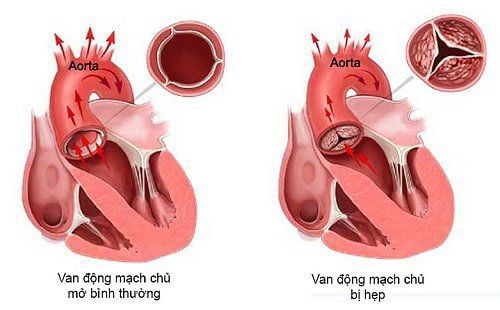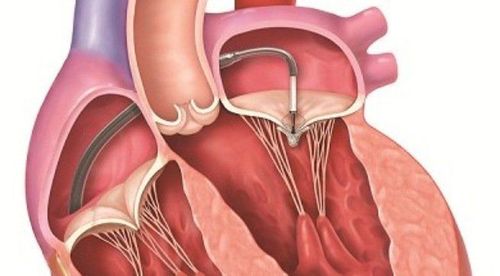This is an automatically translated article.
After a heart valve replacement, whether or not you should get pregnant is a concern of many women. Although pregnancy can put a lot of pressure on the heart and circulatory system, many women with heart valve disease still want to have children. To answer this question, read the article below.
1. What cases need to replace the heart valve?
Aortic stenosis: When the aortic valve narrows so much that the blood flow that the left ventricle pushes into the aorta is blocked. The left ventricle needs to work harder to pump blood out, leading to left ventricular hypertrophy, causing decompensated heart failure. Pregnancy increases the risk of serious complications. Women diagnosed with aortic stenosis should seek medical attention when planning to become pregnant. If the aortic stenosis is severe or if you already have symptoms such as shortness of breath or chest pain, you should not get pregnant until you have surgery. If you are pregnant and have early symptoms, it is necessary to coordinate with a cardiologist and an obstetrician to provide appropriate treatment. Aortic regurgitation: The aortic valve does not close tightly, causing blood flow from the aorta to return to the left ventricle, causing the left ventricle to dilate, increasing pressure on the left heart, also causing long-term condition. heart failure. Pregnant women with aortic regurgitation often have no symptoms when heart function is within normal limits. Change lifestyle, diet, can use diuretics, heart drugs for severe cases of aortic regurgitation with left ventricular dysfunction or patients with clinically symptomatic regurgitation. During pregnancy, it is necessary to note that some drugs such as ACE inhibitors (a common drug used to treat aortic regurgitation) have a risk of causing malformations to the fetus, so they should be replaced with another group of drugs. If possible, surgery should be delayed until after delivery to avoid the risk of miscarriage or premature delivery. Symptomatic patients with left ventricular dysfunction should be hemodynamically monitored during labor. Mitral valve stenosis: The mitral valve is much narrowed, making it difficult for blood from the atrium to go down to the left ventricle, so blood is partially blocked in the left atrium, increasing left atrial pressure causes the left atrium to dilate. As a result, increased pressure in the lungs makes it difficult for patients to breathe, causing symptoms of asthma, acute pulmonary edema, atrial fibrillation, arrhythmia, blood clot formation, and stroke. Patients with mitral stenosis can be intervened with percutaneous balloon dilation. In case the patient is tight with mitral regurgitation or the leaflets are too thick and calcified, the doctor will prescribe mitral valve replacement. Women with severe mitral stenosis should contact their cardiologist for advice on treatment for dilation or mitral valve replacement surgery before planning a pregnancy. Mitral regurgitation: The mitral valve does not close tightly, causing blood flow from the left ventricle to back up into the left atrium. At that time, the left ventricle works harder to ensure that blood is pumped to the body, leading to left ventricular dilatation, consequent heart failure. Patients with severe mitral regurgitation with symptoms of heart failure (dyspnea on exertion, severe dyspnea even at rest) or on echocardiography with reduced ejection fraction should be replaced or repaired. heart depending on the condition of damage to the valve and the system of ligaments and muscle columns in the heart valve. For pregnant women with mitral regurgitation, there may be no symptoms when heart function is still well compensated, but in subjects with severe mitral regurgitation, accompanied by impaired cardiac function, Pregnancy is prone to complications during pregnancy and childbirth. Mitral valve prolapse: It occurs when the valve between the left atrium and left ventricle doesn't close properly. When the left ventricle contracts, it inflates the flap of the valve (prolapse) upward or back into the atrium. It is a disease that often causes few symptoms, does not require treatment, and some women with mitral valve prolapse are able to have a safe pregnancy. If mitral valve prolapse causes a lot of heart valve regurgitation, it should be treated before pregnancy as prescribed by a specialist.
2. Is it possible to have a baby with a mechanical heart valve replacement?
For women, everyone wants to be a mother, but for those who have a mechanical heart valve replacement, should they become pregnant or not is a matter of concern and worry.
Patients with mechanical heart valves need to take anticoagulants for life with the aim of preventing the risk of thrombus formation on the valve (caused valve jamming, cerebral stroke complications, myocardial infarction, ..). However, when the drug is overdosed, it can cause cerebral hemorrhage, gastrointestinal bleeding, bleeding in the muscles and joint capsule,... In addition, in pregnant women, the drug also increases the risk of teratogens, malformations. fetus, miscarriage, stillbirth, especially in the first 3 months of pregnancy. Therefore, for patients with mechanical heart valves, pregnancy will lead to great risks for both mother and fetus.
Women who have prosthetic heart valves and are taking anticoagulants, it is very important to see a doctor when planning a pregnancy. Women who find out they are pregnant after a mechanical valve replacement need to go to a reputable hospital for advice, monitoring, and treatment direction by highly qualified doctors.
3. Replace heart valve should give birth or not?
Currently, with two other options, replacement of biological valves and autologous valves (Ozaki method), women after heart valve replacement can completely perform their motherhood, because there is no need to use drugs antifreeze for life.
The technique of using autologous pericardium to regenerate the aortic valve is a method invented by Professor Ozaki (Japanese) more than 10 years ago. The technique of heart valve reconstruction with autologous materials has now been applied in more than 50 countries around the world and is considered a great step forward, bringing many advantages in heart valve replacement therapy such as: This method is suitable for patients who are women who want to become pregnant. Replacing autologous valves by Ozaki method is an advanced technique, patients who wish to replace autologous heart valves need to go to a large, reputable hospital and the procedure must be performed by a skilled and experienced specialist. , highly professional, well trained.
Heart valve disease is an extremely dangerous disease, especially for pregnant women because it directly affects both mother and fetus. Without special monitoring from a doctor, pregnancy can be very risky. Currently, the development of science and technology has brought more opportunities for women with heart valve disease who want to get pregnant. However, before deciding to become pregnant, the patient needs to go to a specialist in cardiology, obstetrics and gynecology to be diagnosed and advised on the best methods.
Please dial HOTLINE for more information or register for an appointment HERE. Download MyVinmec app to make appointments faster and to manage your bookings easily.













